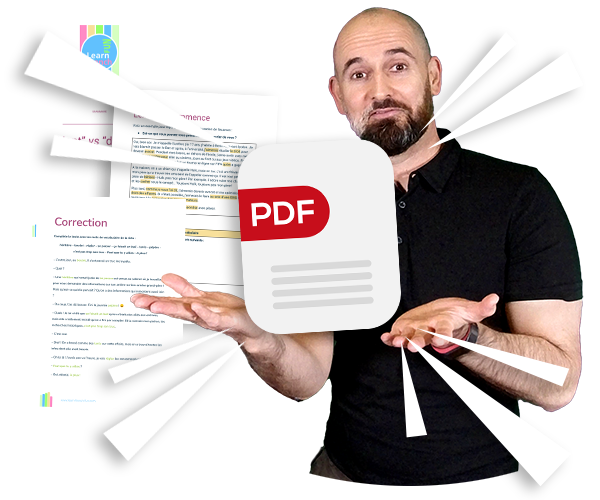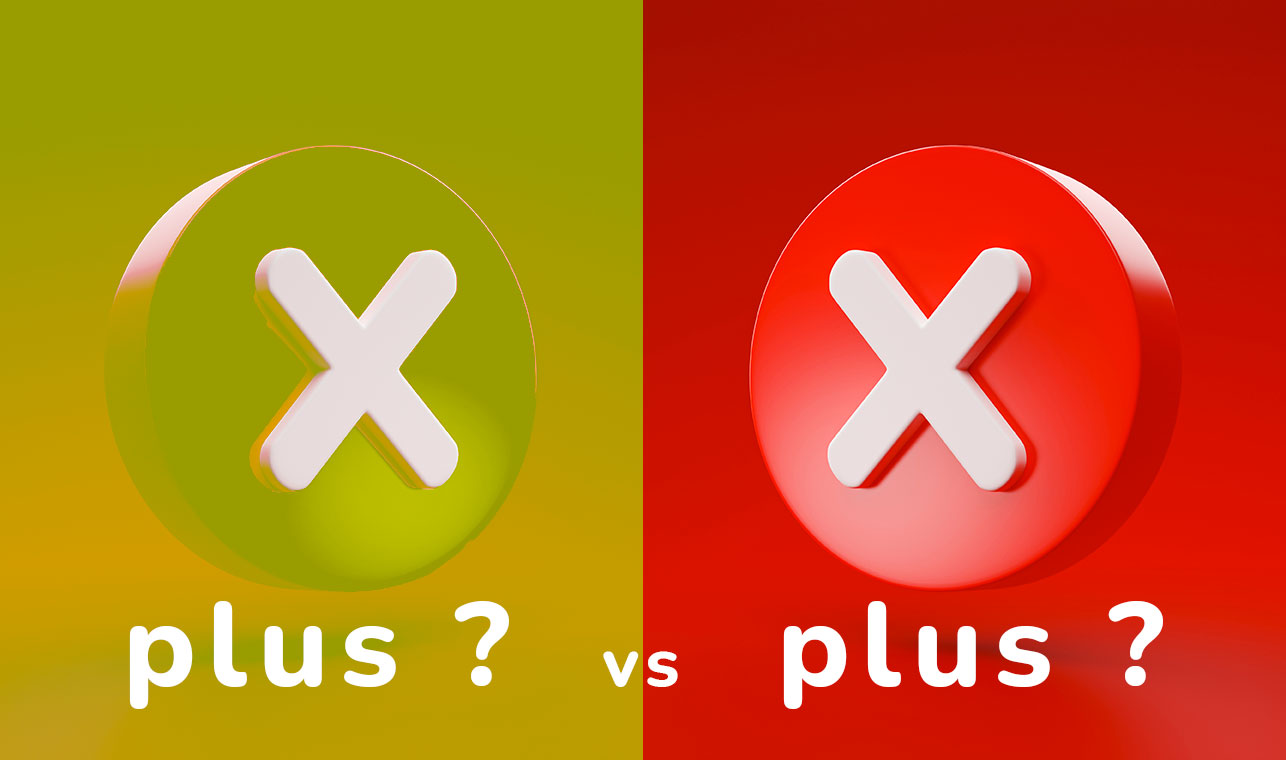In French, the word “plus” can be pronounced in three different ways. But which one is correct? And how do you know when to use each one?
In this blog post, I’ll show you the three different ways to pronounce “plus”, and I’ll give you some tips on when to use each one. Stay tuned!
When learning a new language, there are always a few words that give people trouble. The word “plus” is one of those words for English speakers learning French. This word is often mispronounced by English speakers, but with a little practice you can get it right every time.
There are three ways to pronounce the word “plus” in French. And depending on how you pronounce it, the meaning can be completely different:
You never pronounce the “s” [ply] when :
- the word “plus” has a negative meaning → the negation (ne)…plus
- the word “plus” is followed by a number, a quantity
- you use the word “plus” for a comparison on an adjective or an adverb
You pronounce the “s” [plys] when :
- the word “plus” has the meaning of “more“
- when you make a comparison on a noun or a verb
- when it is the mathematical sign
- in some expressions
You pronounce [plyz] when you have to make the connection in a comparison on an adjective or an adverb that start with a vowel.
Let’s see all this in detail, the word “plus” and its 3 possible pronunciations

PDF Bonus
We have prepared a free PDF to help you understand and master the 7 moods and 23 tenses in French.
👉 Download it for free
At the end, you will have exercises to practice with the correction. 👍
Now, back to my little word and its three pronunciations. It’s the word “plus” which you can pronounce [plys], [ply] or [plyz]. Isn’t that funny?
I’ll explain it all to you and you won’t have any trouble.
“Plus” has a negative meaning?

→ The “s” is never pronounced [ply].
S’il te plaît, arrête, ne m’en donne plus. (Please stop, don’t give me any more.)
→ But if you have to make the connection, make the connection. [plyz]
Il ne va plus_à l’école. (He doesn’t go to school anymore.)
Beware, when the French speak, they tend to systematically forget the “ne” in negative sentences.
So we say:
- Luc a plus d’argent. (Luc has no more money)
- Luc a plus fait de voyage depuis longtemps. (Luc hasn’t made a trip in a long time)
- Luc lui a plus jamais rien demandé. (Luc has never asked him/her for anything.)
And here is the big difference in meaning!
- if I say: Il a plus [plys] d’argent (He has more money), I insist on the idea of his wealth: he is rich, more and more.
- If I say: Il (n’)a plus [ply] d’argent (he has no more money), I mean that he used to have money, but now he has lost his money or spent it. In short, the sentence is negative. But in 97.22% of the oral situations (more or less), the French forget the negative “ne” and say: Il a plus [ply] d’argent.
So, “he has more money” or “he has no more money”… Huge difference, right? That’s why you have to be very careful with the pronunciation of “plus”.
Because if you make a mistake, it’s not just a phonetic error, a cute little phonetic error, but you will completely change the meaning of your sentence!
Do you like learning French with videos?
Receive our free video newsletter every Friday in your e-mail box. You will get 3 “Tips & Tricks” on grammar, vocabulary, phonetics or French culture.
👉👉 Sign up now!
“Plus” has a positive meaning?

→ The “s” is pronounced [plys].
J’adore ! J’en veux encore plus [plys] ! (I love it! I want more of it!)
Be careful with the word “plus” when you make comparisons: “plus… que” (more… than)
In a comparison, it depends on the nature of the word (noun, adjective, adverb or verb):
The word “plus” in a comparison with a noun
→ The “s” is pronounced [plys].
Elle boit plus de vin que moi. (She drinks more wine than I do.)
The word “plus” in a comparison with a verb
→ The “s” is pronounced [plys].
Elle boit plus que moi. (She drinks more than I do.)
The word “plus” in a comparison with an adjective
→ The “s” is not pronounced [ply].
Elle est plus gentille que moi. (She is nicer than me.)
The word “plus” in a comparison with an adjective beginning with a vowel
→ the connection is made [plyz]
Elle est plus_aimable que moi. (She is nicer than me.)
The word “plus” in a comparison with an adverb
→ The “s” is not pronounced [ply].
Elle boit plus rapidement que moi. (She drinks faster than I do.)
The word “plus” in a comparison with an adverb beginning with a vowel
→ the connection is made [plyz]
Elle travaille plus_efficacement que moi. (She works more efficiently than I do.)
Mathematical sign
→ The “s” is pronounced [plys].
3 + 2 = 5 → Trois plus deux…
Followed by a number, a quantity, a fraction, a distribution
→ The “s” is not pronounced [ply].
Plus de 10 km / Plus de la moitié / Plus de 18 ans
More than 10 km / More than half / More than 18
Expressions:
In the following expressions, the “s” is pronounced [plys]:
- en plus (in addition)
- de plus (more than)
- tout au plus (at most)
- Raison de plus (All the more reason)
- sans plus (without more)
- rien de plus (nothing more)
- C’est un plus (it’s a plus)
Yes, I know… If the French could have, they would have certainly imagined a 4th way to pronounce the word “plus” 😂
Well, we already have 3 possibilities, that’s good, right? It’s up to you to be careful according to the context and above all, not to make a mistake between the positive and negative meanings.
Imagine that you have to eat snails, frog legs or oysters🤢.
You have just made a superhuman effort to taste it and be polite. After a few minutes, the French host asks you if you still want it.
You wanted to say “J’en veux plus [ply]” but you made the phonetic mistake of the year and said “J’en veux plus [plys]“.
Too bad for you! You’ll have to keep eating 😂😂
The moral of the story is this: be careful with your French words, especially when it comes to comparisons. Make sure you know how to pronounce them correctly, and use the right word depending on the context. If you’re ever in doubt, have a native speaker check your work.
And remember, practice makes perfect! With a little bit of effort, you’ll be sounding like a pro in no time at all.
Articles that might interest you:
- In France, are discussions at the coffee machine more important than meetings?
- 3 tips to speak French easier
- How can I improve my French accent?
- I’m afraid to speak French
- 3 different ways to pronounce the French word “Plus”
- How to pronounce the French vowels correctly?
- I start to dream in French!
- How to learn French pronunciation?
- Learn French in Montpellier, Paris or somewhere in France to gain your intellectual freedom
- Learn French like a child



